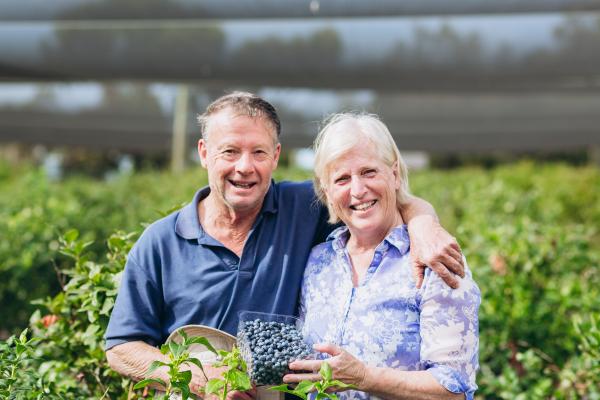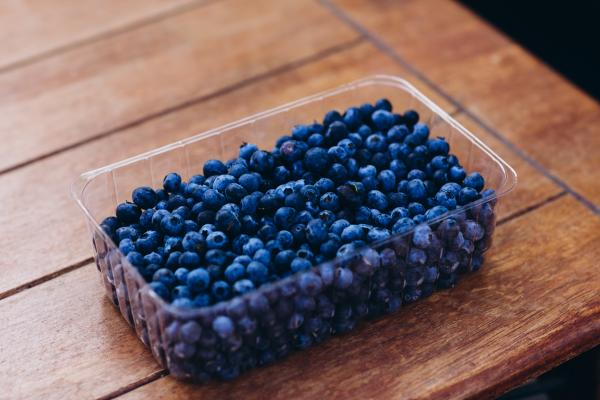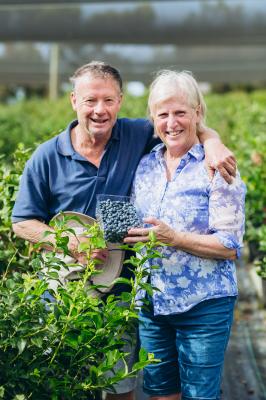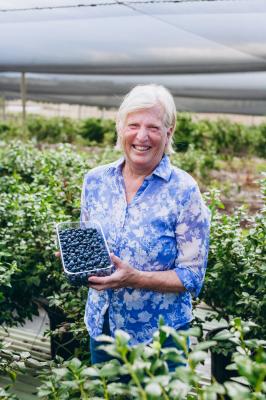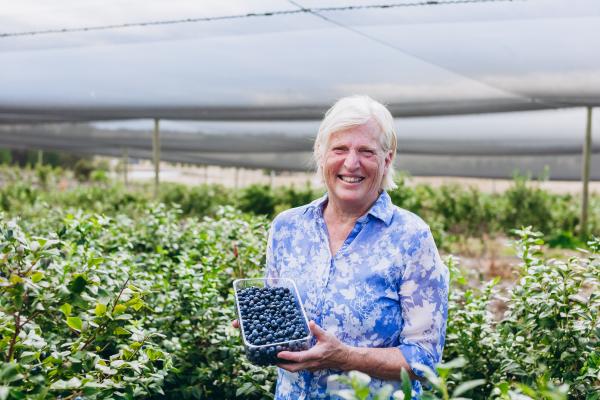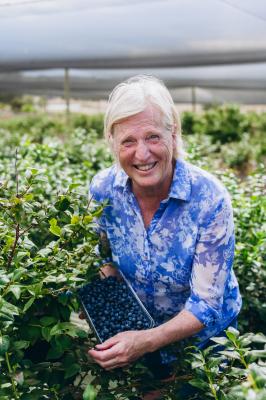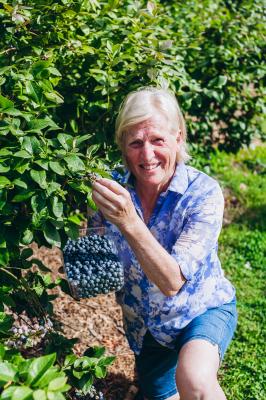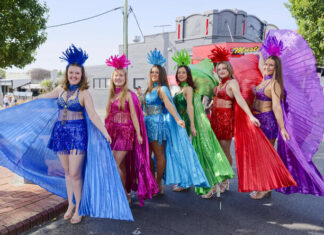The “serendipity” that led to Margaret Tucker introducing blueberries commercially to Australia has continued to shine on her Drysdale farm throughout COVID-19, daughter Christine Lean tells Luke Voogt.
Tuckerberry Hill has not just withstood COVID-19; the blueberry farm has actually increased its business during the pandemic.
“We’re very lucky,” owner Christine Lean, 68, said.
The farm is open for berry picking in summer and the 2019-20 season ended just before the first lockdown, she explained.
Christine and husband David, 71, freeze the remainder of roughly 1.25 million berries, grown from 4000 plants, each year and normally sell out by November.
“This year we sold out by August,” she said.
“I think people are becoming more aware of their food and where it comes from.”
While they had to close their onsite cafe for parts of 2020, they ran a COVIDSafe market from their pavilion to support other local producers.
“They bring it in to us and we sell it to customers, who know that they are going to get local,” Christine said.
“It’s not-for-profit, we only take 10 per cent. It’s like selling it at the market without actually having to be at the market all day.
“With the doors open and the fans on, I figured we were even better than someone going to a green grocers or supermarket.”
Now, with COVID-19 restrictions continuing to ease and a lack of “beach weather”, picking season has boomed, according to Christine.
“We’ve got room here for 50 cars and some days we’re full,” she said.
The couple even started selling blueberry and strawberry beer, in partnership with local “nano-brewer” and American expat Ed Mylan.
“It’s just a little hint in the aftertaste, it’s not sweet like you might think,” Christine said.
Christine grew up in Melbourne, the daughter of anaesthetist and “frustrated carpenter” John Tucker and housewife Margaret.
“Mum never worked a paid day in her life but she worked every day,” she said.
John would come home from work and build various projects and, when Christine left home in the early ’70s, her mother bought a cattle farm in central Victoria.
“She would take her truck up there with her cattle dog Dusty,” Christine said.
“She had this beautiful land and spring water and was wondering if there was something she could grow there.”
So Margaret visited the state agricultural department in Melbourne and just happened to knock on the door of Ridley Bell, who wanted to bring blueberries to Victoria.
“I suppose it’s just luck. Serendipity perhaps,” Christine said.
“There was no commercial growing in Australia at the time – nobody knew about blueberries in those days.”
But the journey to becoming a commercial grower had “a couple of false starts”.
“The first lot of berries had disease in them,” Christine said.
“Unfortunately, she discovered the soil was poor for blueberries.”
Margaret would travel to Werribee to sell the fruit.
“She brought them down to the markets in punnets on a tray and would get nothing for them,” Christine said.
“Nobody knew about blueberries and nobody wanted to buy them. Eventually mum said, ‘this is ridiculous’.”
So Margaret bought a farm in Drysdale in 1981 to grow the fruit better and be closer to the markets, although she and John took several years to move down.
Back in the early ’70s, Christine met “gregarious” rugby player David on the tennis court while they were studying at Australian National University in Canberra.
“He asked me for a game of tennis,” Christine remembered.
They married in 1974 and eventually took over David’s family farm in New South Wales when his dad died.
Over the mid to late ’80s, failed wheat crops, high interest rates and a desire to give their four children a good education prompted them to move to Drysdale.
David got a job teaching at the then Geelong East Tech School while teacher-librarian Christine began helping with her mother’s farm.
About the same time her parents had a light bulb moment that boosted the business.
“It became very obvious to them, after trying to sell them through the markets, that there were heaps of tourists coming down in the holidays who would pick their own,” Christine said.
“Mum was a highly-energetic and clear-minded. She and dad formed a great team.”
But they faced yet another challenge in 1997 when starlings – a pest on the Bellarine Peninsula – “found” the farm.
“Once they found us, we were on their menu,” Christine said.
“People in Barwon Heads were telling us they had blue bird poo in their backyards. Dad tried to train his dog to chase the birds.”
They tried netting, electric wires and even brought in Olympic shooter Michael Diamond to do some “target practice”, Christine said.
Eventually they devised a net that kept the birds in instead and culled them.
In mid-2000 Margaret became sick and died. Soon after Time Magazine labelled blueberries a super fruit and the industry began to take off.
But the challenges kept coming for the farm.
“A big storm dropped the nets down after mum died,” Christine said.
“We had a drought, the dam went dry and I had to let go of 4000 bushes. That’s farming for you isn’t it?
“We bought it from dad in 2003 because he didn’t want to be here without mum.”
Eventually, they hired a contractor to construct commercial-scale netting to keep the starlings out for good.
Berries are now a staple in supermarkets across Australia thanks in part to Margaret’s pioneering, and Tuckerberry Hill is relatively small compared to some local producers.
“Mum would be absolutely ecstatic to see what’s happened with blueberries,” Christine said.
Details: tuckerberry.com.au


